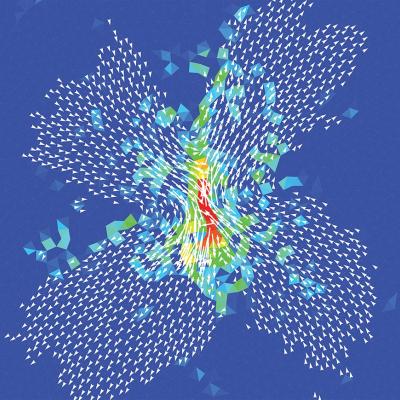Soft matter physics studies typical materials we see and interact with everyday, where direct quantum effects are negligible. These materials are also often soft or "squishy", like foams, emulsions (mayonnaise), gels, granular materials, glasses (amorphous solids), and biological cells and tissues. Unlike simple solids, liquids, and gases they exhibit complex behaviors. Consider shaving foam – it seems like a solid, but will flow easily when perturbed. We can walk on sand or build a sand castle, but sand can also be poured like a liquid. The soft matter group at CCNY physics and the Levich Institute uses experiments, simulations, and theory to push our understanding of these fascinating materials forward.
Statistical physics is one of the key theoretical techniques used to understand soft matter, as well as, a host of other complex systems. Statistical physics exploits the deep connection between local and global behavior, from force networks in soft matter to neural networks in the brain to friends on facebook. The statistics of local interactions allow us to predict and understand global behavior like mechanical response, thinking, and propagation of ideas.
Using Delaunay triangularization to characterize non-affine displacement fields during athermal, quasistatic deformation of amorphous solids. WW Jin, A Datye, UD Schwarz, MD Shattuck, CS O'Hern, Soft Matter 17(38):(13) 2021.
Joel Koplik
My research focuses on fluid mechanics at the micro and nano scales, largely based on numerical calculations. Recent interests include wetting and spreading, interfacial phenomena, liquid drop dynamics and active particles.
Recent Publication: The frictional force on sliding drops (2019)
Hernan Makse
We are interested in the theoretical understanding of Complex Systems from a Statistical Physics viewpoint. We are working towards the development of new emergent laws for complex systems, ranging from brain networks and biological networks to social systems. We treat these complex systems from a unified theoretical approach using concepts from statistical mechanics, network and optimization theory, machine learning, and big-data science that we have developed in our studies of disordered systems in physics.
Complex Networks and Data Science Lab →
Recent Publication: Influence maximization in complex networks through optimal percolation (2015)
Mark Shattuck
In Professor Shattuck's laboratory, we study soft matter, where quantum mechanics is negligible. We focus on experiments, simulations, and theory of granular materials, foams, glassy systems, and biological cells and tissues. A common theme in these systems is that their response is strongly dependent on the type and history of their interactions. A gas at standard temperature and pressure is in an equilibrium state and behaves in a consistent manner. By contrast the flowability of sand depends on the history of how it was packed, even at the same pressure and density. We are interested in ways to recover equilibrium-like behavior in these non-equilibrium systems.
Recent Publication: Publications
Last Updated: 02/21/2022 13:34
